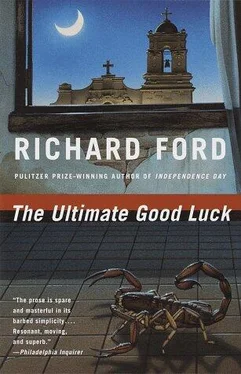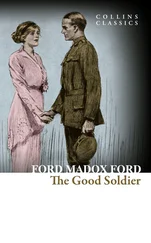“I didn’t notice,” Quinn said.
“You’re just not a woman,” she said.
The cab passed a park where there was an oratory statue of Juárez wearing a concrete frock coat and a friar’s hat. Something different from the deputy of penitentiaries’ portrait. Juárez’s devotees had littered the base with tall purple flowers, and there were two blue policemen standing beside a lone catalpa smoking and guarding the flowers. Beyond the park the houses were neat, pink and green mansionettes in arranged shady rows. All the likeness of Juárez made him be somebody else, somebody he wasn’t, and Quinn thought that was his final good. He assumed nothing and risked everything, and when he was dead you could make him whatever you liked.
“Passion and melancholy get mixed up,” Rae said, still musing about Zago’s wife. “It’s just a long funeral.”
“Is that all your theory?” He was thinking about the bungalow, about getting into and out of it fast.
“That’s why you’re the way you are, Harry,” she said and smiled at him.
“Fucked up, right?” he said. It annoyed him to get figured out, and figured wrong.
“You think you’re always losing something,” she said, “and you think you like to be alone, as if it made you powerful, but neither of those is true. That’s all. I worry what would happen to you if I got killed.”
“So do I,” he said. “But that’s so you won’t have to.”
“I don’t mind,” she said. “It makes me feel better. It ups the ante.” She looked out at the genteel street. The cab had crossed the American Highway and started slowly up into the Reforma, where the houses were situated behind clean walls with citrus trees blooming over the tops. House servants were on the sidewalks pushing strollers.
“I guess I like the low odds better,” he said.
“You think you do,” she said. She was dreamy. “But you just want to be perfect, that’s all, and justify everything you do. I’m not into that, I’m not that stupid. I’ll take feeling good any way I can.”
“You feel good now, do you?” he said and looked at her.
“Now I do,” Rae said and smiled again. “Right now at this very moment, with all those soldiers, inside this cab, I do indeed. That’s enough.”
He thought of Bernhardt and regretted not to have regretted until now, but he’d been occupied.
“You’re never ironic, Harry,” she said airily. “That’s really what’s wrong with you. You need to be more ironic.”
“Like you?” he said.
“Sure. Like me,” she said and looked out the window again. “I’m not so fucking bad.”

The car was where he had left it. A good sign. It sat fifteen meters below the bungalow gate beside a wall grown over with bougainvillea and sky flowers. Two cars were farther up the hill, a Renault and a red VW parked at the American girls’ bungalow. Two boys were setting firecrackers in the street and running, but the street felt unattended.
Quinn watched through the windshield as the taxi eased up Pinos Street, trying to notice anything out of the ordinary. The air was cool and there was a new breeze on the hill not alive in the Centro. The sense of openness reassured him.
“What’s wrong?” Rae said. He had the pistol in his waistband. He was set to light somebody up now. “Why are you looking so strange?”
“Bad habits,” he said. He thought about Bernhardt saying they should be out of the house already.
The cab stopped at the gate. The driver turned and looked at him. Something was making him nervous. “Espera momentito,” Quinn said. It occurred to him to send Rae back down the hill right now, but that was just as risky.
“What if somebody’s inside?” she said, staring in at the bungalow.
“I want my fucking money,” he said, and got out. He took the gun out of his belt and cupped it. The metal door to the bungalow was open. He could see in through to the picture window that gave on the city. Rae’s blue Varig bag was lying in the yard, its insides yanked out. He picked it up and carried it to the door. The boys in the street set off two firecrackers in quick succession, and he could hear them laughing and their feet slapping pavement.
All the lights were on, the furniture was gone, and there was a thin pane of brown water on the floor that stank. The house seemed peaceful and enlarged, and it was empty.
He walked in through the bedroom. The bed and the table and his clothes were gone. In the bathroom the water was deeper. It seeped out below the toilet and flooded the shower trap with silt. Flies were humming on the ceiling.
He squatted behind the toilet and put the Varig bag and his pistol on the seat top. He could hear the taxi motor idling in the street. The smell was very grave, and the cesspool water soaked through his shoes. He hadn’t thought about what had happened. But it was a given, something he could’ve figured out if he wanted to. He and Rae were simply not here anymore, and this was how you knew it.
The tiles behind the toilet were in place. He dug in the paste with his fingers and lifted, allowing the silt water to drain in the hole. He dug both hands in under the tiles and pulled the money bags out in two dripping handfuls and pushed them, tiles and all, into the Varig bag. The water had already filled the hole, and he saw where there was a deep crack in the porcelain from the base to the rim of the grail where somebody had kicked it. He wondered who did the kicking, and just exactly when, and then he heard Rae at the door. He zipped the Varig bag, picked up his gun, and went to the front where Rae stood, looking out over the sill. She stared at him oddly. “What is this?” she said. She almost smiled.
“Nothing. I’ve got the money,” he said. Water was in his shoes. He wanted out of the bungalow. He pushed her backward out the doorway. He didn’t know if Deats had done it, but Deats could get credit.
“Who did all this?” Rae said. She was holding on to the jamb, still looking inside, her face pale.
“Don’t go in there,” he said. The cab driver was trying to see them through the passenger window. He wanted to get out, and was staring at the pistol.
Rae suddenly grabbed his arm above the elbow and pulled it down. “Are they after us?”
“Get the fuck in the cab,” he said. He put the Varig bag under his arm and pulled her toward the gate.
“Now just who did this?” she insisted, letting herself be pulled.
“It doesn’t matter. I’ve got the fucking money.”
The cab suddenly drove off down Pinos Street, leaving them in the open gate. The boys in the street were gone. Their papers fluttered on the pavement where they had been squatting.
“Was there somebody else inside?” she said loudly, pulling away.
“No. Forget that, just forget it,” he said.
“Did you lose something important, Harry?” she said.
“No.” He thought of the photograph of himself in the white sombrero smiling out at space. There was no record of that time’s ever having taken place now.
“It’s bad luck, isn’t it?” Rae said, staring down the street at the empty Dodge parked against the bougainvillea wall.
“No,” he said. “It doesn’t mean anything. Get in the car.” And he pushed her down the street toward the Dodge.
AT THE HOTEL there was a message at the administración. The lobby was full of German tourists in walking shorts with Swiss suitcases on wheels, trying to speak in English to the day clerk who seemed offended and was shaking his head no. The Germans wanted out of their reservations, and they were shouting that the town was dangerous now. They stared at Quinn when he took his message, and started yelling again when he didn’t offer to help.
Читать дальше








![Theresa Cheung - The Dream Dictionary from A to Z [Revised edition] - The Ultimate A–Z to Interpret the Secrets of Your Dreams](/books/692092/theresa-cheung-the-dream-dictionary-from-a-to-z-r-thumb.webp)




